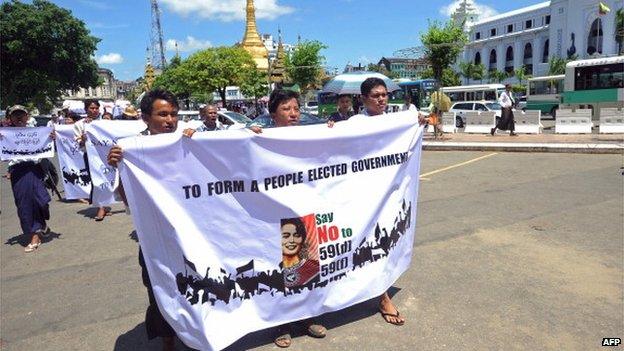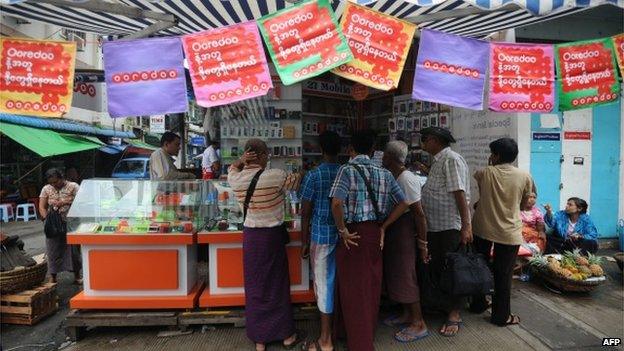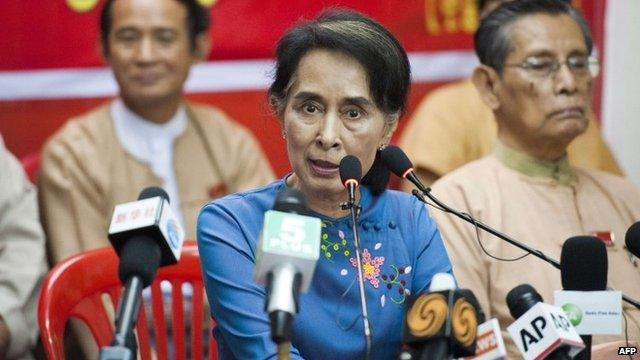Has Myanmar's reform journey ground to a halt?
- Published
Jonah Fisher reports
At a press conference last week, opposition leader Aung San Suu Kyi was asked for her assessment of Myanmar's reform process.
"Stalled," she said, before challenging anyone in the room to name a significant change that had taken place in the last two years.
So is she right? Has the much vaunted Burmese reform project ground to a halt?
The answer depends on how narrowly you define reform. When she speaks, Ms Suu Kyi is thinking politics.
The pace of political change has certainly slowed. In part that's because the easiest reforms took place in the first 18 months of Thein Sein's presidency.
In the Burmese context, "easy" means decisions that don't upset the army.
Political prisoners were released, censorship of newspapers and the internet lifted and a (flawed) law passed allowing public demonstrations.
In a short period of time, one of the world's most tightly controlled societies opened up in a way few had thought possible.
Stories critical of ministers were suddenly on the front page of private newspapers, and demonstrations, mostly connected to land rights, have become almost daily events.
But the early pace of those changes hasn't been sustained. There was no way it could.
'Disciplined democracy'
So did the reformers run out of steam? Did Thein Sein's project reach a roadblock manned by hardliners in the Burmese army? Or perhaps we're close to the final destination - that is, with sanctions lifted and the army still really in charge.
Ms Suu Kyi's main frustration is that the constitution remains unchanged.
Drafted in 2008, it entrenches the military's control of political life, guaranteeing it a quarter of the seats in the Hluttaw (the Burmese parliament), and a veto over any changes to the constitution.
This is what its architects proudly call a "disciplined democracy".

Opposition supporters have protested against clauses in the constitution
The opposition have focused on the two parts they want changed most.
They are: the clause barring anyone who has foreign family members from becoming president, which effectively prevents Ms Suu Kyi from taking power (because of her British sons) and Article 436, which gives the army a veto on constitutional changes.
Much of Ms Suu Kyi's annoyance stems from the fact that the legislature that she joined in 2012, and thus legitimised, is now being cynically used to thwart her ambition.
Just as it would in mature democracies, responsibility for shaping the constitutional reform process was handed to a series of parliamentary committees.
With each committee mirroring the composition of the military-dominated Hluttaw, they've deliberated for months and delivered entirely predictable results.
Altering the "Suu Kyi clause" has been dismissed outright (as a threat to national sovereignty), while amending Article 436 will be discussed in parliament, though if the army remains opposed there's no way it can be changed.
Ms Suu Kyi's slim hopes of taking the top job after the election in 2015 now rest on a backroom deal among senior leaders.
Looming in many minds is the possibility of a constitutional crisis this time next year. What if the party that wins the most seats is unable or unwilling to nominate a president?
Lives changing fast
Though the changes that Aung San Suu Kyi wants most have stalled, that's not to say there haven't been other important developments. It's just that they don't directly involve Ms Suu Kyi.
Ever since independence in 1948, Myanmar has never been truly at peace, with minority ethnic groups fighting guerrilla wars against the Burman-dominated state.
The last three years has seen real progress towards what would be an unprecedented nationwide ceasefire agreement. All the major rebel groups have been brought into the process, attracted by the promise of dialogue on a more federal future.
For President Thein Sein, a peace agreement would be the crowning achievement of what's likely to be his only term in office. Unfortunately for him, with a deal within reach, the number of clashes has begun to increase once more.

Qatari-owned firm Ooreedoo began selling mobile phone SIM cards in August
Outside politics, particularly in the big cities, people's lives are changing fast.
Thanks to new laws and regulations, Myanmar's economy and banking sectors are liberalising and opening up to the outside world. GDP growth is rapid, though improvements in living standards still lag a long way behind.
On Myanmar's streets two new foreign phone companies are currently battling it out for a lucrative new market.
After years in which mobile phones and the internet were government-run and SIM cards the preserve of the elite, there's now the prospect of low-cost data and unrestricted access to information. In itself that's a game-changer.
So is the Myanmar reform glass half full or half empty? It rather depends who you are, and what you're drinking.
- Published6 November 2014

- Published3 September 2018